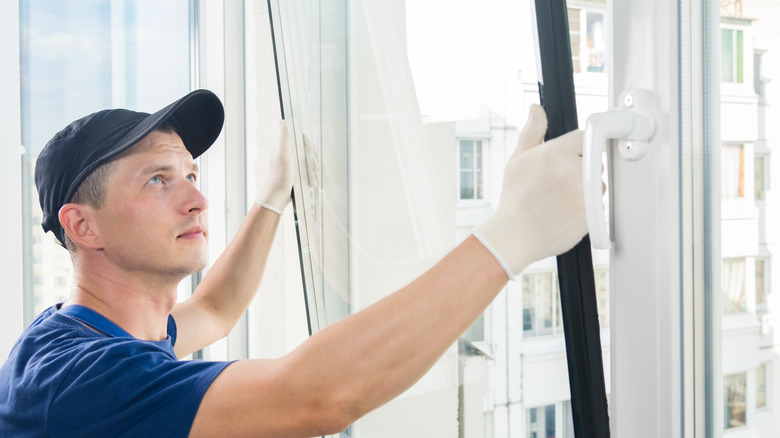The Biggest Scams To Watch For With Window Installers
Is it time to upgrade your windows? Maybe, if you're looking to up your home's energy efficiency, stop that infernal draft, or replace damaged panes. Well, hiring any contractor offers challenges. Ultimately, you want a fair price and someone who does quality work, but too often con artists victimize homeowners using high-pressure tactics, inflated prices, below-standard work, and other manipulative techniques.
So the quandary becomes: How do you know who to hire for your window installation? The first step is to do the same due diligence you might adhere to for hiring any contractor. You want to thoroughly research vendors — get referrals from people you trust like friends, family, and neighbors. Then check reviews from online sites such as the Better Business Bureau. Not all states require contractor licensing, but if yours does you can also look at any complaints filed against them (see National Association of Attorneys General to look up your attorney general and contact that office for more information). You should also make sure your contractor is bonded and has insurance.
After speaking to several contenders you should ask for at least three written estimates and compare them. Keep in mind that the lowest price isn't always the way to go. You should ask the contractors about any differences in cost so you understand the variation. Once you've selected a company or individual, ask for a written contract that details the work and outlines deadline and cost parameters, advises Home Improvement Scams, Tools to Reduce Your Risk.
Be careful when handing over money to window installers
Many cons try to get money up front, and will disappear with your cash without doing the work, or they'll fix something half-heartedly, leaving you with a mess or an unfinished job. While paying a portion of repairs is common, that deposit should never require the full amount. Usually the first payment won't exceed a third of the entire price, according to AARP, which recommends paying that at the same time materials for the project arrive.
Never use cash, only a check or credit card. Pay your deposit after you've received a detailed contract, which should include a description of the work, costs, and anticipated time frame. Before any final fees are given, ensure that you approve of the job and the site is clean. Lastly, arrange any financing yourself — con artists sometimes try to convince home owners to take home equity loans or reverse mortgages that pay them. You always want that money to arrive in your mailbox.
Some scammers even use things like disasters and local laws as a way into your home. After a hurricane or storm, such individuals scout neighborhoods looking for things that need "fixing." Another tactic has fraudsters posing as some sort of official, like a building inspector, to access your home and then recommend immediate repairs. Some of these will ask to go through your insurance, demand up-front payments, or pressure you to sign contracts (via Home Improvement Scams, Tools to Reduce Your Risk).
Be wary when window installers upsell the job
While it's true that contractors may uncover problems once the window frame is opened up, unfortunately this is a common scam. It also, sadly, often happens after the window is removed and you have a giant, gaping hole in your living room. The contractor suddenly claims you have termite damage or a broken beam, and that the price is now three times what you accepted. What can you do?
Sometimes these fees are legitimate and you should pay them — but if you feel like scamming is happening, try hiring a home inspector, a specialist from the National Association of Home Builders, or have someone from your local building department check things out and ensure the changes are legit, advised House Logic.
You can include a provision in the contract about such occurrences as well. Make sure a section concerning unexpected job changes are addressed that establish parameters on additional charges. House Logic recommends adding a section that says a change order, signed by both the homeowner and vendor, must be completed before any alterations in the project. Contracts are important — and provide legal options in case a window installer deviates from the course promised.
If the window price seems too good to be true, it might be a scam
Some window replacement vendors wow you with fantastic bargains, as noted by Eby Exteriors blog. The site explains that those super low prices (like $199) are never attainable; the company always has some caveat why you don't qualify for the lowest offer or add extra costs, like sealing the windows. Also, you should know what you're getting. Many of these so-called deals offer inexpensive products, but when you replace windows you want the job to last. It's not like repainting your living room. So opt for an opportunity that upgrades what you currently have rather than installing something sub-standard.
Consider what your needs are prior to contacting vendors. Are you looking for a better design, more effective insulation, or a certain function? "These days, when it comes to windows, it's all about energy efficiency," said Lance Premeau, product and market analyst for Kolbe Windows and Doors, to the DIY Network. So one of the things you might consider is looking at this advantage. The site recommends checking the windows you're considering with Energy Star, a federal government program, to ensure the quality.
Life Hacker points out that Energy Star-rated windows sometimes even offer tax credits. The website mentions that while shopping for energy-efficient windows you should also look at R-values, which show how well it works. Higher numbers equal better insulation for your home.
Watch for red flags from window installers
Contractors come in all shapes and sizes — some might insist on uniforms, others might dazzle you with the latest technology, and a few might go old school, wearing their tool belt around their waists. Don't judge a vendor by their appearance completely. Instead, look for knowledge, consistency, and dedication. Today's Home Owner points out that professionalism is important. When you first interview the window installer, for instance, did they come with broken tools when they measured the window? Is their truck in disrepair? When you speak about materials, does the individual or company only want to use discount windows that are obtained by a "friend?" Or can you request the type you want so you can do all the research required and get the perfect size and style for your home?
You also want to notice if the contractor's address is a P.O. box — that's not always a dead giveaway about someone's ethics, but a physical office does show a consistent presence. Before hiring anyone, check references and see if any complaints about them are listed on the Better Business Bureau or Angie's List, now Angi, and at your state licensing bureau. If you're already under contract and the vendor violates any part of the agreement, insist that they go back to the original agreement. Price and scope of work changes should only happen when you've agreed to it by updating the contract.
Make sure you ask your window installer lots of questions
A window installer should always be willing to speak with you and let you ask as many questions as you like about the job, their business, windows, etc. The Money Pit advocates talking to all your contenders before hiring them and having them answer questions like: How long has your business existed? How often have you installed a window in the last year? What safety precautions do you expect to take?
Make sure you query on everything about the window installer's licensing and registration, from if they've been sued to what subcontractors will be hired and if those individuals licensed and insured. You also want to find out about their experience with windows. How long the vendor has replaced them? Which manufacturer they have worked with? Will they dispose of your old windows? Think about what you'll need to know about your project, including a timeline for payments, if building codes or permits are a concern, what windows they recommend, and if warranties or guarantees come with the installation.
Spend some time hiring the contractor that will install your windows. Remember, you want to find someone who is happy to share knowledge with you and is willing to talk through the process. Someone who speaks over you or who is too persistent and demanding is not looking out for your best interest.





